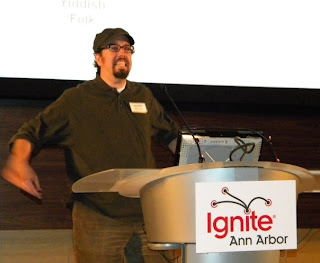
I used the generator at Wordle.Net to make the cloud.

The email came from Mike Cohen, klezmer (Kleztraphobix) and jazz woodwind player, and my new hero."I just saw your mention about the CD I recorded and produced in Putti last year on your blog and want to thank you for your interest. I'm giving an interview for South African Jewish Radio on Friday and I just gave a lecture here in New York at Adelphi University a few weeks ago. If you have a few minutes, I'd love to share some of the story with you.
I had heard Smithsonian recording and was fascinated by it. About a year and a half ago there was a screening in New York of a documentary made for South African TV about the Abayudaya and decided to go. It turns out that I had met the director the night before at a gig I was playing (I'm a woodwind player)
I ended up on the Save Ugandan Jewery newsgroup and knowing they are coffee farmers I asked about buying some coffee. That opened a dialogue between myself and Putti's rabbi and community leader, Enosh Keki Mainah, He heard some of my music on the net and commented about how much he liked it. I told him I liked their music as well.
A few weeks later, Enosh tells me that his mother had written a lot of original music for the psalms and they wanted to record it but it was expensive. Did I have any advice? Without hesitating I told him I would go to Putti and we would record the music. This was November of 2008. My wife was 3 months pregnant so I knew that if this was going to happen, it had to happen soon. It was too late to apply for grants, so I sent a letter to everyone I knew and raised enough money to get myself over there and, if all went well, there was enough to do the recording. Enosh convinced me that there was a great studio in Mbale which is a big town about 10 km from Putti.After 17 hours of flying and a 6 hour drive north to get to Mbale, I go to the studio. The studio turns out to be 1 mic and an ancient computer! Hence the rawness of the recording. We had to make this work so we recorded the way they did it in the 50's. We put the singers around the mic and I would bring people closer or push them back to balance out the vocals. All in all, we got some great tracks. I took the vocals back and added the percussion, flute and bass and we had an amazing recording. The music is infectious and original. Putti is an amazing place for music.
As the web site says, all the money goes back to Putti. They are very poor and the money makes a very real difference."
(From JID) "Of making Jewish music there is no end, but how many contemporary composers of distinguished work in this genre have been featured on From the Top, National Public Radio's program about exceptional young musicians? Jeremiah Klarman, age thirteen when he appeared on the NPR show, may be the sole exception. Now seventeen, with a demonstrated mastery of styles from classical to klezmer, and with chamber, orchestral, and pop compositions under his belt, Klarman has turned his lavish and protean talents to choral music. A premier of his latest work, the cantata Hallel, Shir v'Or ("Praise, Song, and Light"), drawing largely on well-known verses from the book of Psalms, took place in late December at Temple Emanuel in Newton, Mass. Performed by the Zamir Chorale of Boston under the direction of Joshua R. Jacobson, it culminates in a room-rocking, soul-lifting Halleluyah! for chorus and orchestra."
"Jewish Samba (named TROPICASHER in Brazil) is a mix of Jewish and Brazilian music. We would like the public in the USA to know more about it as it is being an excellent tool for peacemaking, breaking barriers and approching people. There are Tropicasher Sambas in Portuguese, Hebrew and English as well as an excellent BOSSA NOVA made with the Anthem of Israel, haTikva, on www.tropicasher.com.br. For videoclips: or www.youtube.com/tropicasher"Here's a fun video from Tropicasher...
I'm a Conservative Jew living in a Christian farm town in Michigan, USA. For me, Jewish music used to be Adon Olam, Hava Nagila, and Fiddler on the Roof. I started getting a clue a few years ago. Jewish music is Klezmer dances, Sephardic ballads and Chassidic niggun. It's thousand year old hymns, three hundred year old Shabbat table songs and 60 year old partisan resistance songs. It's contemporary hip-hop, punk rock, electronica, jazz, and chamber music. In addition to loving its musical and spiritual qualities, Jewish music helps me connect my family with a much broader and diverse Jewish culture than is available locally. The Teruah blog helps me document my exploration and share it with others. Why the name Teruah? Teruah is a call on the shofar on Rosh Hashanna.


Check out my talk at the Ann Arbor District Library last year. "Ignite Second Stage: The Silver Age of American Jewish Music is Happening Now! And You're Missing It!"
